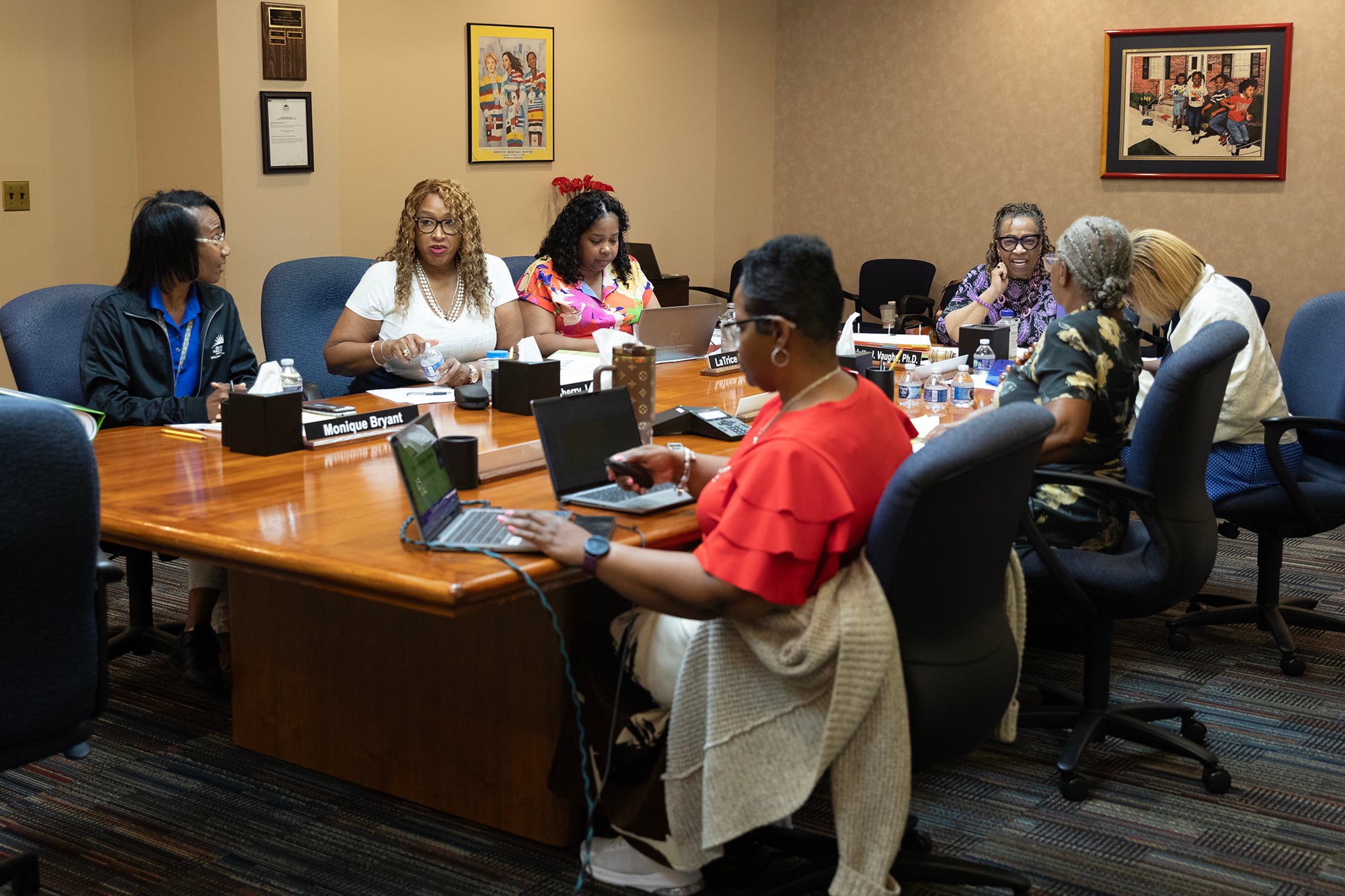Sign up for Chalkbeat Detroit’s free newsletter to keep up with the city’s public school system and Michigan education policy.
After a heated discussion Wednesday, the Detroit school district’s board voted to bypass a lengthy selection process for a vacant seat and instead offer the job to the runner-up from a prior vacancy.
The seat on the seven-member Detroit Public Schools Community District board is likely to open next week. Board member Sherry Gay-Dagnogo, who participated in Wednesday’s meeting, plans to resign to start a job with the city of Detroit.
The name of the runner-up was not released publicly during the previous selection process. But during Wednesday’s meeting, Chair Corletta J. Vaughn identified the candidate as Bessie Harris, a retired special education teacher and principal at Palmer Park Preparatory Academy. Harris unsuccessfully ran for the board in 2022 and in 2020.
Vaughn was admonished by members of the board for naming the candidate. Vice Chair Latrice McClendon asked if it was confirmed that Harris was the runner-up, and others on the board said the candidate should not yet be named. The board voted to strike the mention of Harris’ name from the record of the meeting.
Harris could not be reached for comment Wednesday.
Board members went through a monthlong search for a new board member in July after Angelique Peterson-Mayberry stepped down from the school board. She was appointed to the Wayne County Commission.
Steven Bland Jr. was appointed to fill the seat after a process that included submitting resumes, letters of intent, answering survey questions on key issues for the district, and public interviews. Fourteen candidates were ultimately interviewed for the position.
Board members scored the candidates on their application materials and interviews. The scores were then tallied live during a public meeting by a third-party law firm.
Instead of going through the “time-consuming” process again, board member Monique Bryant suggested Wednesday that the second-highest scoring candidate from the last round of applications be selected.
“In light of the fact that we just went through this less than 90 days ago, we had more than enough candidates that we have already vetted,” Bryant said.
Other board members agreed, arguing that repeating the entire process would be a burden to the administrative staff who would be saddled with facilitating the additional special board meetings.
Gay-Dagnogo said streamlining the selection would allow the board to address urgent work. Holding more public interviews and meetings would push back usual board business, she added.
Board member Iris Taylor objected, saying deviating from the process they used for the last appointment might be interpreted by the public as a decision lacking in “consistency” and “integrity.”
Bland, the newest board member, said he did not support the move because he did not participate in the last round of screening candidates. To allow Bland to participate in the selection, Vaughn suggested truncated options, such as interviewing the top three candidates from the last round.
The district’s policy on filling vacancies requires the board to “seek qualified and interested candidates from the community.” Candidates must submit a notice of their interest, be interviewed by the board, and receive a majority vote from the board to be appointed, according to the policy.
The board must make an appointment within 30 days of the vacancy being announced.
After an hour of discussion Wednesday, four board members – Bryant, Gay-Dagnogo, McClendon, and Ida Short – voted to suspend the policy for the purpose of filling the new vacancy. Taylor, Vaughn, and Bland voted against it.
Once the policy was suspended, the board voted on the new process that would be used for the appointment. Members voted to offer the seat to the runner-up candidate from July, with Taylor abstaining.
The board will notify the candidate within 24 hours of Wednesday’s special meeting and will allow another day for the candidate to accept the position in writing. If the candidate does not accept the appointment, the board will decide on another selection process.
Once a candidate accepts, the board will hold another special meeting to vote on their appointment. They still must get a majority vote from the board to officially take the seat.
The new board member appointed to fill Gay-Dagnogo’s seat will serve through the end of 2026 instead of completing her entire term. A Michigan Association of School Boards policy requires appointed board members to run if there is already a set board election the following November.
Hannah Dellinger covers Detroit schools for Chalkbeat Detroit. You can reach her at hdellinger@chalkbeat.org.





